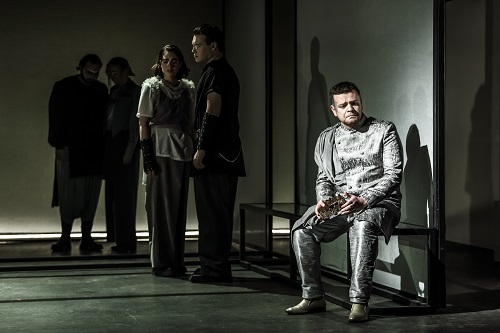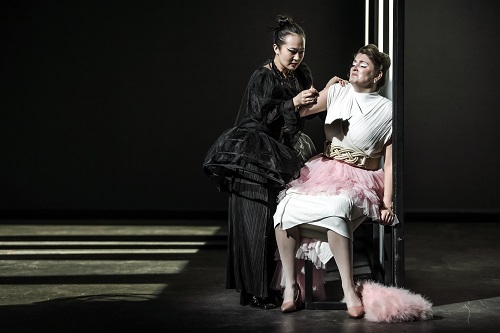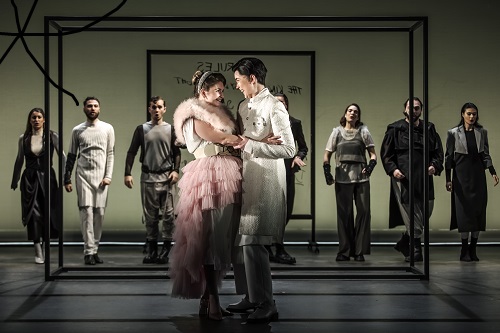‘The Rules’ define a male-centric world as oppressive and restrictive as Margaret Atwood’s Gilead. Kings rule by divine right. Gender is binary. The value of a woman is her purity. A woman who deceives will be punished by death. Only a man can defend a woman’s honour. Duty comes before family.
Written on a transparent whiteboard during the overture to this production of Handel’s Ariodante, directed by Olivia Fuchs at the Royal Academy of Music, these Rules establish a patriarchal domain of dehumanising convention. The cast and chorus enter this world, selecting their stylish monochrome costumes from a clothes-rail, choosing their roles, and their gender – both Ariodante and Polinesso are taken by mezzo-sopranos. Between the gleaming white donned by Ariodante and Ginevra and the shining black of Polinesso and Dalinda, there are countless shades of grey. The theatricality is enhanced by striking baby-blue eyeshadow and cheeks daubed with white and silver.
The monochrome palette extends to Yannis Thavoris’ minimalist set: a sparse cube, in which square frames are swivelled – a bit too frequently in Act 1, perhaps – to demarcate particular spaces and suggest confinement. They are used to good effect in the later scenes, reinforcing the condemnation of Ginevra within a patriarchal prison. Jake Wiltshire’s dramatic lighting deepens the opposition of light and dark, good and evil, freedom and restraint.

As if grappling with the demands of Handel’s vocal writing was not sufficient challenge, the starkness of the stage meant that the young singers had to work hard to create a compelling drama too – and, under Fuchs’ judicious direction, work terrifically hard they did, with superb results. There were considerable cuts to Acts 2 and 3 – including some of the principals’ arias, much of the recitative and the dances – with detrimental effect to the ‘sub-plot’ of the relationship between Polinesso and Dalinda, but the result was a pared-down narrative which was delivered with clarity, pace and theatrical punch. Sometimes there was a little too much gesture and movement in the arias, but the weighty emotional moments – ‘Scherza infida’, ‘Dopo notte’, ‘Manca, oh Dei!’ – were poised and dramatically focused.
Much of the impact of the performance was due to the insightful and energetic musical direction of David Bates. An RAM alumni himself, Bates led from the harpsichord and inspired wonderfully vivid playing from the young instrumentalists, neglecting not a single detail, finding infinite shades and moods. It seems unfair to pick out individuals, so stylish and professional was the whole ensemble, but Holly Little was an ever-eloquent double bassist and bassoonist Shelby Capozzoli’s tender, expressive playing did much to evoke Ariodante’s pain and despair in ‘Scherza infida’. Cellist Jessica Abrahams’ alert and tasteful recitative accompaniments were notable, too, while horn-players Samuel Middleton and Xinhe Zhao and trumpeter Thomas Thornton had their moment on stage.
The expansive range of Handel’s vocal writing and the challenges posed by those rapid runs and florid ornaments didn’t unnerve the cast who, unanimously, sang and acted with total commitment. As Ariodante, Clover Kayne struck a heroic figure and sang with a lovely, rounded tone. ‘Scherza infida’ is long, but Kayne had the stamina, artistry and musical intelligence to hold the audience’s attention throughout, varying the emotive colouring. The festive joy of ‘Dopo notte’ was no less engaging, Kayne using her flexible, warm mezzo-soprano to convey Ariodante’s bubbling delight, but retaining a certain nobility despite the vocal fireworks.

Ellen Mawhinney’s Ginevra brought the sole dash of sartorial colour to the stage, sporting candyfloss-pink ra-ra frills and a fake-fur stole over her white dress, and topping off her outfit with a sparkling tiara. In Act 1, I found Mawhinney’s Ginevra a little too frivolous: yes, she needs to be light-hearted and to have little sense of the darkness which will engulf her when accused of betrayal, but she shouldn’t seem an air-head. But, subsequently she did convey Ginevra’s dignity and created a strong sense of a female identity and strength that sought and was painfully denied autonomy. Initially, she occasionally strayed a little sharp, but her descent into madness, ‘Il mio crudel martoro’, was controlled and affecting, and Mawhinney wrung every emotional drop from Ginevra’s Act 3 aria of deepest grief and despair.
As Polinesso, Rebecca Hart had striking stage presence. Machiavellian, masculine and seething with malignity, this Polinesso prowled and pounced with terrific dynamism. Vocally Hart and Kayne were well-matched, with Hart’s strong chest voice and silky phrasing making her seduction of the deluded Dalinda utterly convincing. In the latter role, Binny Supin Yang was an effective foil for Ginevra, and her eventual confession and regret were conveyed powerfully. The soprano had the high notes, too, which she delivered confidently, with a piercing glint.

George Curnow was a resonant Lurcanio, acting with physicality and making a stirring entrance to denounce Ginevra. Daniel Vening’s King of Scotland was dignified and authoritative, and Samuel Stopford a commendable Odoardo. The chorus were no less committed than that cast and their contribution to the success of Fuchs’ concept considerable.
Handel’s lieto fines are always tricky to make convincing, and the various cuts here might have meant that the movement from tragedy to joy would be even more unpersuasively swift, but Fuchs’ unfussy, clear direction, and the credibility of the relationship between Ariodante and Ginevra that Kayne and MaWhinney developed, made such fears unnecessary. The reunited lovers’ duet was an invitation for the chorus to join them in their happiness, and to help them erase ‘The Rules’, one by one. Removing their costumes and assuming gender-fluid identifies, they returned to a present day that is no less in need of reminding of the dangers of dystopian dictatorship.
Claire Seymour
Ariodante – Clover Kayne, Ginevra – Ellen Mawhinney, Dalinda – Binny Supin Yang, Polinesso – Rebecca Hart, Lurcanio – George Curnow, King of Scotland – Daniel Vening, Odoardo – Samuel Stopford; Director – Olivia Fuchs, Conductor – David Bates, Designer – Yannis Thavoris, Lighting Designer – Jake Wiltshire, Royal Academy Chorus and Sinfonia.
ABOVE: Clover Kayne (Ariodante) (c) Craig Fuller